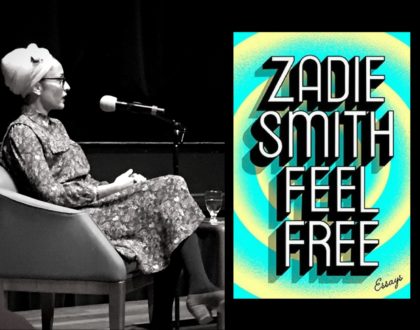Feel Free by Zadie Smith

Event & Book Overview
On Monday, March 26, 2018, Zadie Smith, renowned author of several award-winning novels and essay collections, including her most recent publication, Feel Free, spoke at the Tsai Performing Arts Center on the Boston University campus. Throughout the hour-long conversation, facilitated by Christopher Lydon of WBUR’s, Open Source, Zadie shared advice on writing, along with personal reflections on American History, identity, technology, the arts and popular culture.
“This writer challenges and sometimes explodes the trite, complacent and orderly categories of social class, ethnicity, language, and in fact, the human character itself. She dispels the false notions of purity, simply by showing reality, social reality and personal reality, in its impure, often laughable and catastrophic forms. An artist of many mindsets, Zadie is not ignorant of history, but neither is she deformed by it,” said former U.S. poet laureate and professor, Robert Pinsky, in his opening remarks.
Among the many topics covered, a theme emerged from the conversation, the connection between the impact of social media on society and the current political moment it has empowered. Using a critical, dissenting lens, Zadie spoke of our collective obsessions with the internet and all of its associated gadgets and devices, the many ways in which we use these tools to render avatars of ourselves and make distance from one another. She spoke of the backlash she received from young people, who yelled at her and called her a Luddite, after she wrote an essay a few years ago, criticizing Facebook as an unfortunate development in human and social communication. The essay, which appears in her most recently published anthology, Feel Free, unapologetic-ally proclaims that the world would be better off if people didn’t insist on channeling their communications through a platform modeled in the image of the mind of a sophomore, tinkering in a Harvard dorm room. In the essay, she poses an important question; “What is The Social Network–and Facebook itself–really about?”
During the Q&A portion of the conversation, audience members asked Zadie to speak on Mark Zuckerberg’s current Facebook data breech dilemma, involving Cambridge Analytica. She didn’t have much to say about this particular chapter of Facebook’s saga, but instead opted to talk about the greater implications signified by the moral lapses of Zuckerberg’s big idea, the ways in which education systems fail even their most brilliant students by not providing adequate moral foundations throughout the learning process.
“The question of what a moral education consists of, what the humanities have meant, what they were for, seems to me more important now (in the age of big data) than ever. We have brilliant young people, with leftist perspectives, who make incredibly, morally confounding decisions.” Problem solvers, who are exceptionally good at deriving answers that are not mindful of the needs of the people, whose identities have become products, packaged and traded in this billion-dollar data industry. “Something is not working in the classroom,” she says, by way of explanation. “Something is not happening correctly,” if brilliant young people are leaving our academies and institutions without a solid, moral education.
“I’m not talking about the morality of religious education. I’m not talking about dogma,” she says. “I’m talking about going beyond the surface, beyond the things you put on your profiles to SEEM like a good person. Those things are different than taking action.”
To learn more about Zadie Smith’s thoughts on the topic, pick up the book Feel Free at your local bookstore or library.
Book overview from Amazon.com
“From Zadie Smith, one of the most beloved authors of her generation, a new collection of essays
Since she burst spectacularly into view with her debut novel almost two decades ago, Zadie Smith has established herself not just as one of the world’s preeminent fiction writers, but also a brilliant and singular essayist. She contributes regularly to The New Yorker and the New York Review of Books on a range of subjects, and each piece of hers is a literary event in its own right.
Arranged into five sections–In the World, In the Audience, In the Gallery, On the Bookshelf, and Feel Free–this new collection poses questions we immediately recognize. What is The Social Network–and Facebook itself–really about? “It’s a cruel portrait of us: 500 million sentient people entrapped in the recent careless thoughts of a Harvard sophomore.” Why do we love libraries? “Well-run libraries are filled with people because what a good library offers cannot be easily found elsewhere: an indoor public space in which you do not have to buy anything in order to stay.” What will we tell our granddaughters about our collective failure to address global warming? “So I might say to her, look: the thing you have to appreciate is that we’d just been through a century of relativism and deconstruction, in which we were informed that most of our fondest-held principles were either uncertain or simple wishful thinking, and in many areas of our lives we had already been asked to accept that nothing is essential and everything changes–and this had taken the fight out of us somewhat.”
Gathering in one place for the first time previously unpublished work, as well as already classic essays, such as, “Joy,” and, “Find Your Beach,” Feel Free offers a survey of important recent events in culture and politics, as well as Smith’s own life. Equally at home in the world of good books and bad politics, Brooklyn-born rappers and the work of Swiss novelists, she is by turns wry, heartfelt, indignant, and incisive–and never any less than perfect company. This is literary journalism at its zenith.”
